
Early warnings of typhoons and hurricanes, if heeded, may prevent unnecessary loss of lives. Similarly, warnings in scripture are positive if heeded; they are meant for the spiritual well-being and eternal security of believers.

When scripture repeats something, it means that it is highly significant. It has to be repeated lest we forget or adopt a laissez faire attitude towards it. It is so important that believers must take heed.
What did Christ repeatedly warn concerning the end times?
DECEPTION

Be aware, be warned. It’s already here. We should wise up by preparing ourselves against deception. Jesus warned that deception will be a prominent feature during the end times (Olivet Discourse, Matthew 24).
Believers have to be wise—in fact, extremely vigilant and discerning—if they want to stand up against deception in these last days.
Of the various end time characteristics—deception, persecution and turbulent times—mentioned by Jesus in the Olivet Discourse, deception seems to be the most prominent. Even supposedly mature leaders can be deceived. If they can be deceived, don’t you think the flock will fare even worse?
In fact, in Matthew 24, Jesus warned believers to be wary of deception not once but four times:
- Take heed that no one deceives you (vs. 4).
- For many will come in My name, saying, ‘I am the Christ,’ and will deceive many (vs. 5).
- Many false prophets will rise up and deceive many (vs.11).
- For false christs and false prophets will rise and show great signs and wonders to deceive, if possible, even the elect (vs. 24).
Similarly, the other writers of the Synoptic Gospels also warned against deception:
- “Many will come in my name, saying, ‘I am he!’ and they will lead many astray” (Mark 13:6).
- “And he said, See that you are not led astray. For many will come in my name, saying, ‘I am he!’ and, ‘The time is at hand!’ Do not go after them” (Luke 21:8).
Christ’s strong warnings against deception are reflected in the teachings of the apostles Paul, Peter and John. They all took a firm stand against destructive heresies (2 Corinthians 11:3; 2 Peter 2:1; 1 John 4:1).
- “But I am afraid that, as the serpent deceived Eve by his craftiness, your minds will be led astray from the simplicity and purity of devotion to Christ” (2 Corinthians 11:3).
- “False prophets also arose among the people, just as there will also be false teachers among you, who will secretly introduce destructive heresies, even denying the Master who bought them, bringing swift destruction upon themselves” (2 Peter 2:1).
- “Dear friends, do not believe every spirit, but test the spirits to see whether they are from God, because many false prophets have gone out into the world” (1 John 4:1).

BE FAITHFUL
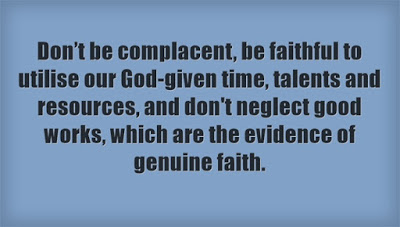
Christ compared a believer to a steward placed in charge of a master’s household. If the steward was faithful, he would be richly rewarded upon the master’s return.
“Who then is the faithful and wise servant, whom his master has set over his household, to give them their food at the proper time? Blessed is that servant whom his master will find so doing when he comes. Truly, I say to you, he will set him over all his possessions” (Matthew 24: 45-47).
Like how the master dealt with the steward, He will hold us accountable if we do not fulfil the task He has given us. If God’s servants are complacent and irresponsible, they will be punished when the Master (Christ) comes back unexpectedly.
“But if that wicked servant says to himself, ‘My master is delayed,’ and begins to beat his fellow servants and eats and drinks with drunkards, the master of that servant will come on a day when he does not expect him and at an hour he does not know and will cut him in pieces and put him with the hypocrites. In that place, there will be weeping and gnashing of teeth” (Matthew 24: 48-51).
A similar warning is found in the Parable of the Talents (Matthew 25: 14-30). The moral of the teaching here is that believers ought to wisely utilise our time, talents and resources to advance God’s kingdom. The one-talent man, who buried his talent, was condemned and sent to the outer darkness, a place of weeping and gnashing of teeth.
This danger of careless complacency is emphasised in the Parable of the Ten Virgins where the foolish virgins were excluded from heaven as they did not have sufficient oil in their lamps (Matthew 25: 1-13).
The importance of good works is highlighted in the final judgment (Matthew 25: 31-46) when Christ will separate *** the sheep (genuine believers) from the goats. The sheep are those whose lives are evidenced by good works—done “as unto Christ”.
Even if we fail to appreciate Christ’s warning in the first account (steward must be responsible for his master’s household), the message will soon be apparent to us as Christ repeated it in the Parable of the Ten Virgins, Parable of the Talents and the final judgment when the sheep will be separated from the goats.
Liberal teaching tells us that believers saved by grace merely need to rest in Christ’s imputed righteousness; God will always see us as righteous, He will not point out our faults or convict us of sin. But the truth is …
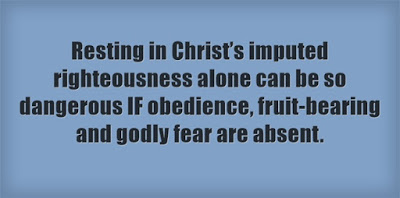
The message is loud and clear: Don’t be complacent, be faithful to utilise our God-given time, talents and resources, and do not neglect good works, which are the evidence of genuine faith.
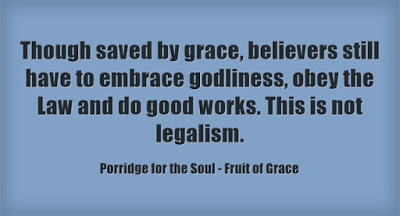
ENDURE TILL THE END
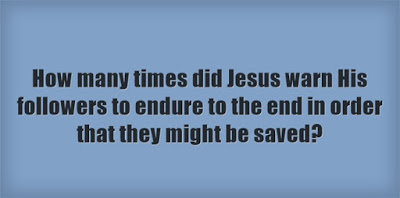
In the Olivet Discourse, Jesus warned true believers that they have to endure end time persecution, deception and lawlessness in order that they might be saved.
“Then they will deliver you up to tribulation and kill you, and you will be hated by all nations for My name’s sake. And then many will be offended, will betray one another, and will hate one another. Then many false prophets will rise up and deceive many. And because lawlessness will abound, the love of many will grow cold. But he who endures to the end shall be saved.” (Matthew 24:9-13)
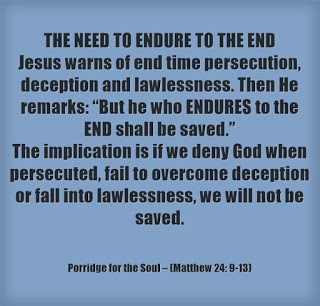
Christ’s end times warning to endure—and persevere in the faith—is repeated elsewhere in the Gospels:
- “Brother will deliver brother over to death, and the father his child, and children will rise against parents and have them put to death, and you will be hated by all for my name’s sake. But the one who endures to the end will be saved” (Matthew 10: 21-22).
- “And you will be hated by all for my name’s sake. But the one who endures to the end will be saved” (Mark 13:13).
- “You will be hated by all for my name’s sake. But not a hair of your head will perish. By your endurance you will gain your lives” (Luke 21:17-19).
- “If anyone does not abide in me he is thrown away like a branch and withers; and the branches are gathered, thrown into the fire, and burned” (John 15:6).
Notice that John—the writer who is distinct from the writers of the Synoptic Gospels (Matthew, Mark and Luke)—recorded in Revelation so many instances about the need to overcome before believers can inherit eternal life.
- “He who has an ear, let him hear what the Spirit says to the churches. To the one who conquers I will grant to eat of the tree of life, which is in the paradise of God” (Revelation 2:7).
- “He who has an ear, let him hear what the Spirit says to the churches. The one who conquers will not be hurt by the second death” (Revelation 2:11).
- “The one who conquers will be clothed thus in white garments, and I will never blot his name out of the book of life. I will confess his name before my Father and before his angels” (Revelation 3:5).
What the foregoing implies is that believers who overcome will get to inherit eternal life; those who fail to overcome will have their names blotted out from the book of life. Sounds harsh? But it is the truth.

In conclusion, Christ warned many times that believers have to:
- Be alert and vigilant against deception
- Be faithful; prove it by the way we live
- Endure to the end that we might be saved
Christ’s end time warnings are so important that they have to be repeated. Let’s take heed for the sake of our spiritual welfare and eternal security.
Christ categorically stated that heaven and earth will pass away but His words will not pass away. If we ignore Christ’s repetitive end time warnings, we do so at our own peril.
*** Separation of good and evil
Notice that Christ repeatedly warned that there will be a separation of good and evil. He used farming and fishing metaphors, which were familiar to the listeners in that era, to get His point across:
- In the Parable of the Wheat and the Tares (Matthew 13: 24-30, 36-43), the tares will be gathered and burnt whereas the wheat will be preserved.
- In the Parable of Dragnet (Matthew 13:47-52), the kingdom of heaven is like a net full of fish. When the net is full, men will select the good fish and discard the bad ones.
RELATED POSTS
These three areas of deception are just as alive today as they were in the Corinthian church long ago.
Just believe and every spiritual blessing is yours. Be happy because you have already bought an instant ticket to heaven. Repentance is merely a change of way of thinking. No need to emphasise obedience as it will nullify God’s grace. Don’t worry about working out your faith, self-denial, endurance or overcoming because nothing you do or fail to do will cause you to lose favour in God’s sight. After all, future sins are automatically forgiven. And once you are saved, it means you are always secure. You merely need to rest on the imputed righteousness of Christ; God will always see you as pure.
An end time reflection on being prepared for Christ’s return
What will earth be like when Christ returns? Why did Jesus mention Noah and Lot when referring to the end times? Notice that not many were saved in the days of Noah and Lot. Only eight persons got saved in Noah’s ark and only three escaped the destruction of Sodom. The majority perished because they lived as if God did not exist or willfully lived in sin.
Knowing God’s ability to keep us safe for eternity is not enough.
We need to emphasise personal responsibility as well.
Some believers may lose their eternal rewards BUT eventually they are saved. In the Parable of the Ten Virgins, did the foolish virgins merely lose their rewards or much more?
Two different views—easy and difficult ways to heaven
Note: Dr Lim Poh Ann is a medical practitioner. He was the former editor of Asian Beacon magazine (Dec 2008 – Oct 2011). He can be reached at his Facebook page, www.facebook.com/AskDrLi
SOURCE OF ARTICLE: http://limpohann.blogspot.my/2017/09/christs-repetitive-end-time-warnings.html
|Share The Good News|

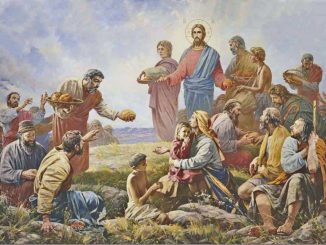


Leave a Reply